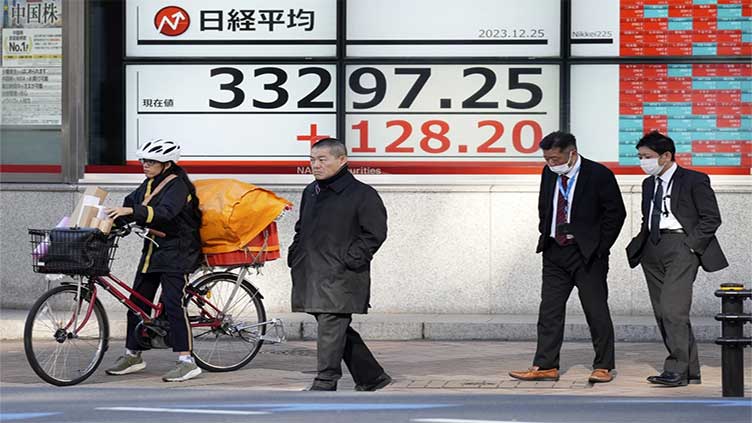Wall Street gains ahead of earnings, oil falls as Middle East tensions escalate

Business
Wall Street gains ahead of earnings, oil falls as Middle East tensions escalate
NEW YORK (AP) -Coming off their worst week since October, markets on Wall Street pointed higher early Monday as investors got data from the government’s latest retail sales figures and a handful of high-profile earnings reports.
Futures for the S&P 500 and the Dow Jones Industrial Average each rose 0.6% before the bell.
Oil prices fell despite tensions roiling the Middle East, where an attack late Saturday marked the first time Iran had ever launched a military assault on Israel, despite decades of enmity dating back to the country’s 1979 Islamic Revolution.
A barrel of benchmark U.S. oil declined 70 cents to $84.96 a barrel. Brent crude, the international standard, lost 68 cents to $89.77. Slower demand from China, combined with forecasts that growth in supply is outpacing demand, has kept prices in check.
“While the drone attack has grabbed headlines, its immediate impact on global markets, particularly oil prices and inflation concerns, may be subdued,” Stephen Innes, managing partner at SPI Asset Management, said in a commentary. “The precision and limited lethal impact of Iran’s response suggest a strategic approach aimed at minimizing damage rather than escalating tensions.”
Nearly every sector showed gains early Monday, but none more than defense contractors. Lockheed Martin led the way, rising 1.8% before the bell.
Apple shares ticked down less than 1% after a report showed that the iPhone came in at No. 2 in phone deliveries in the first quarter, behind Samsung. Apple iPhone sales have faltered in China, causing concern for investors because of that country’s weakening economy and reports that the government there may prohibit its workers from buying iPhones.
In Europe at midday, Germany’s DAX and the CAC 40 in Paris each rose 1%, while in London, the FTSE 100 slipped 0.1%.
In Asian trading, Japan’s benchmark Nikkei 225 slipped 0.7% to 39,232.80.
In currency trading, the U.S. dollar rose to 153.89 Japanese yen from 153.07 yen, hitting another 34-year high as investors shifted toward the traditional haven in times of uncertainty. The euro cost $1.0652, up from $1.0635.
Australia’s S&P/ASX 200 dipped 0.4% to 7,754.50, while South Korea’s Kospi shed 0.4% to 2,670.43.
Hong Kong’s Hang Seng dropped 0.6% to 16,619.33. The Shanghai Composite gained 1.3% to 3,057.38 after the market regulators announced further measures to support the financial sector.
Elsewhere in Asia, Taiwan’s Taiex was 1.4% lower and the Sensex in India fell 0.8% as the country geared up for a lengthy national election process.
On Friday, shares fell on Wall Street following a mixed start to the earnings reporting season.
The S&P 500 sank 1.5%, closing out its worst week since October. The Dow Jones Industrial Average dropped 1.2% and the Nasdaq composite fell 1.6% from its record set the day before.
A stream of reports this year has shown both inflation and the overall economy remain hotter than expected. That’s forced traders to scale back forecasts for how many times the Federal Reserve may cut its main interest rate this year. Traders are largely betting on just two cuts, according to data from CME Group, down from forecasts for at least six at the start of the year.


